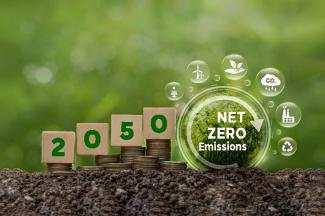The U.S. Department of Energy (DOE) and NETL are developing the next generation of advanced carbon dioxide (CO2) capture concepts to support the United States in achieving ambitious goals for a greenhouse gas (GHG)-neutral economy by 2050, a carbon-free power sector by 2035 and a 50% reduction from 2005 levels in economy-wide net GHG pollution by 2030.
Research and development efforts have led to reductions in both capital and operating costs through the implementation of energy and process efficiencies and the development of advanced CO2 capture media (solvents, sorbents and membranes).
NETL intramural research and projects undertaken with partners span a broad portfolio, including post- and pre-combustion capture, to reduce carbon emissions across a wide spectrum of industries and from the atmosphere. Work undertaken by NETL to support these efforts resulted in multiple successes over the past year. Notable projects included:
- Providing project management support and oversight for a large pilot CO2 capture project at the City Water, Light and Power plant, a pulverized coal-fired unit, in Springfield, Illinois. Research concentrates on the use of BASF Corporation’s proprietary solvent with process and engineering innovations to achieve significant increases in energy efficiency and reduced costs for CO2 recovery from power plants.
- Reaching an agreement with United States Steel Corporation to field test an advanced membrane developed by NETL researchers to capture CO2 emissions from a blast furnace (point source carbon capture) at the Edgar Thomson Works in Braddock, Pennsylvania. The project sets the stage for the development of membrane technology that can be used at steel mills, cement kilns and other industrial sites that generate significant volumes of GHG.
- Hosting the 2023 DOE Office of Fossil Energy and Carbon Management (FECM)/NETL Carbon Management Research Project Review Meeting, a five-day event in Pittsburgh, Pennsylvania, at which the development of novel materials, advanced with NETL oversight, to capture CO2 from power plants, difficult-to-decarbonize industries and ambient air was discussed. The meeting provided attendees with opportunities to share in the knowledge gained during the completion of more than 150 NETL-supported research projects.
- Supporting field tests of direct air capture (DAC) technology projects in California and Alabama. DAC technologies allow for the capture of CO2 from the atmosphere, addressing both current and legacy emissions to achieve negative emissions.
- Releasing an updated version of an open-source tool to calculate the cost of transporting CO2 by pipeline from where it is captured to where it can be stored underground or converted into useful products. The tool, known as the FECM/NETL CO2 Transport Cost Model (CO2_T_COM), estimates revenues and capital, operating and financing costs for transporting liquid phase CO2 by pipeline.
- Earning recognition for excellence at the North American Membrane Society annual meeting. NETL’s Lingxiang Zhu, a researcher who specializes in the development of membranes to capture CO2 from industrial sources, received the 2023 Young Membrane Scientist Award for his substantial contributions to the field of membrane science.
- Using microwaves to accelerate sorbent regeneration and showing that room temperature microwave-accelerated regeneration of sorbents for DAC can advance the science of CO2 capture.
- Partnering with food processing company Archer Daniels Midland (ADM) to demonstrate an integrated system of capturing and processing CO2 and transporting it from an ethanol plant to the Mt. Simon Sandstone saline reservoir for permanent geologic storage. Widespread deployment of large-scale carbon capture and storage technologies at sites like ADM’s ethanol plant could offer insight into reducing CO2 emissions at industrial operations throughout country.
- Completing site visits in multiple states where solvents, sorbents, membranes and DAC technologies are being tested by NETL partners in industry and at other national labs to capture CO2 from industrial sources and ambient air. The visits, which were restricted during the pandemic, allowed NETL researchers to learn first-hand how these partners are working to meet projects goals and mitigate technical, operational and scale-up risks and issues.
NETL is a DOE national laboratory that drives innovation and delivers technological solutions for an environmentally sustainable and prosperous energy future. By leveraging its world-class talent and research facilities, NETL is ensuring affordable, abundant and reliable energy that drives a robust economy and national security, while developing technologies to manage carbon across the full life cycle, enabling environmental sustainability for all Americans.




